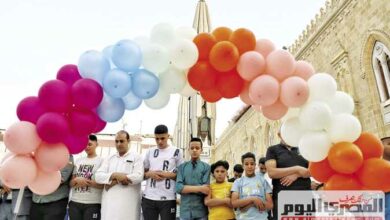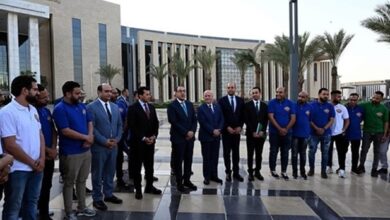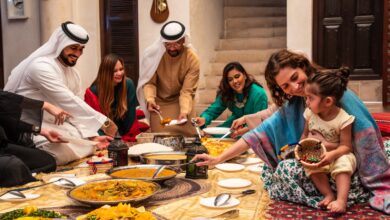Waiting for prayers to start, the guests of the table of the merciful in Garden City are all talking about the food. Upon seeing my camera, they say at once: “No camera here. Have a seat, but do not take pictures."
Tables of the merciful are charity Ramadan tables set up on the streets. A few people living in the neighborhood, who are usually well-off, make food available to anyone for free.
Volunteers serve food in iron plates. Tonight, it’s chicken, rice and pickles. As the prayer starts, everybody jumps on the food.
When one hears the word Ramadan, he or she likely thinks of fasting, or a long and tough day of abstinence from food and drink. The best part comes with breaking the fast: iftar.
Iftar consists of a huge meal centered on meat, which people eat after sunset. It’s a time when family and friends gather around the table to enjoy a meal that has been carefully prepared.
Though Iftar is a feast that all should enjoy, not all can afford it. Ramadan puts everybody on the same level. Rich or poor, everybody must have iftar, as it is the most important meal of the day. Around each district of Cairo are other tables of the merciful. From people living on the streets to tourists, the tables of the merciful welcome whomever wants to eat.
After having filled up his stomach a little, a man who calls himself Ahmed, a 23-year-old shoe polisher, insists: “It's here that you can discover what Egyptian society is made of, as we are the lowest class in Egypt. We can’t even afford to feed ourselves during Ramadan."
Ahmed lives in Manial, a 20-minute microbus ride from Garden City. “It’s too far to go home for iftar, so I have to stay downtown. But I can’t afford to eat out so I come here," he says.
Ahmed never knows how much money he is going to make on a given day, as it depends on how his business goes. His precarious life is brightened by iftar.
“My friends are here and people who volunteer treat us as equals and with smiles on their faces; they don’t look down at us, like many would do,” he says.
Ashamed of having to sit at the tables, many do not want to be photographed.
As iftar finishes, the guests enjoy the last sip of tamarind tea and give each other cigarettes. Between two drags, Mohamed, a sixty-something electrician, is thankful.
“Those dishes are good, fresh and homemade. It’s not leftover food like we could find in other places. I live around the corner, but we cannot afford to have meat at home,” he says.
“If the organizers of these tables decided to stop, my family and I would have to go somewhere else to eat. I like it here though, I know everyone and the atmosphere is great,” says Mohamed.
Once everybody is finished eating, volunteers disburse the remaining food to whoever wants it. Hassan, a fruit seller in Garden City, has been doing this for more than 15 years.
“For the love of God. It’s religious, but I also know all of people who come, and I like to help,” says Hassan.
Hassan usually takes some food from the tables and brings it to his siblings. Volunteers pile up the chairs and bring everything back to the organizer’s house.
The event’s organizer prefers to remain anonymous. Humble, he doesn’t even want to go downstairs while people are eating.
“I’d rather not to be seen; I don’t want them to feel like they owe me anything, because that’s not the case,” he says.
Downstairs, everyone knows that he is the person who feeds them every night. He remembers that his grandmother started the table on this street corner because it is in front of the local mosque, so it was visible and easy to find.
“It’s a religious deed. When you can, you have to feed people who cannot afford it; solidarity between people is key,” he says.
Seated next to him, his mother adds: “By giving money or food to the needy, God will give us something good in exchange.”
Along with a couple of neighbors, each spends over LE2500 for the whole month, an amount that includes the food and the two extra workers they might hire to make the food, which takes around four to five hours to prepare.
Every night when the sun sets, around 60 to 80 people come and receive iftar; they can either take the food back home or eat at the table of the merciful. Usually only a few eat at the table, and there are six tonight.
The organizer knows them all, and he knows that some of them might be ashamed to come by. In that case, he’ll get someone to send the food to their houses.




